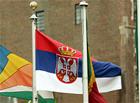Status: Unknown
Dessislava Dimitrova, December 5, 2011
 In less than a week, the European leaders will gather for the last for this year European Council in order to discuss several key issues, among which the enlargement process, which includes accepting Croatia as a new member and granting a candidate status to Serbia. And while the accession treaty with Croatia will be signed for sure, whether Serbia will take the next step towards EU accession will become clear in the very last moment.
In less than a week, the European leaders will gather for the last for this year European Council in order to discuss several key issues, among which the enlargement process, which includes accepting Croatia as a new member and granting a candidate status to Serbia. And while the accession treaty with Croatia will be signed for sure, whether Serbia will take the next step towards EU accession will become clear in the very last moment.
What happened on Friday, December 2, is an example for why is that.
In her speech to the lower house of the German parliament on Friday, ahead of the December 9 European Union summit, Chancellor Angela Merkel clearly outlined that Serbia had nothing to hope for next Friday. "The path of Serbia into the EU can only lead through the normalisation of its relations with Kosovo. I regret that Serbia has so far not lived up to these expectations sufficiently and therefore the conditions for being awarded the status of a candidate are not yet in place. Serbia is also accused of having contributed to an atmosphere in which German KFOR soldiers were attacked with guns and injured in northern Kosovo. I say that this is not acceptable,” she said.
Yet when visiting Belgrade in August Merkel made it clear that she would not step back and called on the Serbian authorities that, if they wanted the country to get a candidate status, they have to obtain tangible results in their dialogue with Pristina, to facilitate EULEX peacekeeping mission’s work in Kosovo and to remove the parallel structures in the northern part of the former province.
Several months later the dialogue between Belgrade and Pristina is resumed with inconsistent success due, among all, to the fact that the two parties and the mediator (the EU) interpret the results of the talks in a different way.
For example, following the eighth round of negotiations, which started on November 30, the EU issued a statement later on Friday, according to which an agreement had been reached on the key issue of joint management of the border crossings between Serbia and Kosovo. ”This means that the parties will gradually set up the joint, integrated, single and secure posts at all their common crossing points. EULEX will be present in line with its mandate. The integrated management for crossing points (IBM) concept will be gradually implemented as soon as practically possible,” the statement reads.
30, the EU issued a statement later on Friday, according to which an agreement had been reached on the key issue of joint management of the border crossings between Serbia and Kosovo. ”This means that the parties will gradually set up the joint, integrated, single and secure posts at all their common crossing points. EULEX will be present in line with its mandate. The integrated management for crossing points (IBM) concept will be gradually implemented as soon as practically possible,” the statement reads.
It adds that, as a result of the previously reached agreements, it is expected that there will be full implementation of the freedom of movement agreement as of 26 December 2011, resulting in free travel for everyone. Furthermore, and in line with the agreement on civil registry, the parties will start copying documents on 5 December 2011.
And while Edita Tahriri, who leads the Kosovo negotiations team said, quoted by Serbian media, that an initial agreement had been reached and the Kosovo delegation was going back to Pristina, the head of the Serbian delegation, Borislav Stefanovic, denied this. Stefanovic told the Belgrade-based B92 television that no agreement had been reached, but that the two parties had been working hard and trying to find an acceptable solution for both of them as soon as possible and Serbia was ready to continue the talks.
Apparently, however, this is not enough for Chancellor Merkel, who has a lot more serious issues to solve before the summit.
 Bakir Izetbegovic, Andrej Plenkovic | © Council of the EU
Bakir Izetbegovic, Andrej Plenkovic | © Council of the EU Aleksandar Vucic, Recep Tayyip Erdogan | © Serbian Presidency
Aleksandar Vucic, Recep Tayyip Erdogan | © Serbian Presidency Jean-Claude Juncker, Zoran Zaev | © European Commission
Jean-Claude Juncker, Zoran Zaev | © European Commission